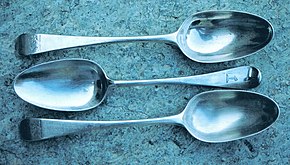
Back فعال بالمقادير القليلة Arabic Олигодинамичен ефект Bulgarian Den oligodynamiske effekt Danish Oligodynamie German Efecto oligodinámico Spanish اثر الیگودینامیک Persian Effet oligodynamique French Oligodinamikus hatás Hungarian Олигодинамический эффект Russian Олігодинамічний ефект Ukrainian

The oligodynamic effect (from Greek oligos, "few", and dynamis, "force") is a biocidal effect of metals, especially heavy metals, that occurs even in low concentrations. This effect is attributed to the antibacterial behavior of metal ions, which are absorbed by bacteria upon contact and damage their cell membranes.[1]
In modern times, the effect was observed by Carl Nägeli, although he did not identify the cause.[2] Brass doorknobs and silverware both exhibit this effect to an extent.
- ^ Han, Seonggeun; Kim, Jaewon; Lee, Youngseok; Bang, Junhyuk; Kim, Cheol Gyun; Choi, Junhwa; Min, Jinki; Ha, Inho; Yoon, Yeosang; Yun, Cheol-Heui; Cruz, Mutya; Wiley, Benjamin J.; Ko, Seung Hwan (12 January 2022). "Transparent Air Filters with Active Thermal Sterilization". Nano Letters. 22 (1): 524–532. Bibcode:2022NanoL..22..524H. doi:10.1021/acs.nanolett.1c02737. ISSN 1530-6984. PMID 34665632.
- ^ Nägeli, Karl Wilhelm (1893), "Über oligodynamische Erscheinungen in lebenden Zellen", Neue Denkschriften der Allgemeinen Schweizerischen Gesellschaft für die Gesamte Naturwissenschaft, XXXIII (1)
© MMXXIII Rich X Search. We shall prevail. All rights reserved. Rich X Search